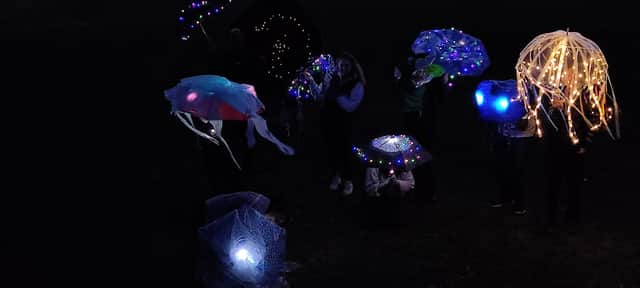Environment: Global protest urging the government to call for a halt to deep-sea mining


Nine Greenpeace volunteers at Sheaf Valley Park created a human wall of deep-sea jellyfish. The banner simulated the bioluminescence of many of the deep sea’s creatures, by hanging fairy lights from old and broken umbrellas. It was part of a global protest urging the UK government to call for a halt to deep-sea mining. This protest took place ahead of the International Seabed Authority (ISA) meeting on deep sea mining in Kingston, Jamaica next month.
Anne Grange, a volunteer from Crookes, said:
‘On Saturday, I joined volunteers from Greenpeace Sheffield to make a human banner of jellyfish. Deep sea mining would destroy the habitat of multiple fantastic sounding but little-known sea life such as lion’s mane jellyfish, yeti crab, scaly-foot snails or barreleye fish. That’s why ahead of World Oceans Day, we’re sending a message to our Sheffield MPs and PM Rishi Sunak that they need to take ocean protection seriously and call for a ban on deep sea mining.’
Advertisement
Hide AdAdvertisement
Hide AdThis global banner protest is the latest step in the campaign to protect our oceans. Throughout May and June, volunteers have been engaging the public through a series of activities to make them aware of what is at stake and to put pressure on the UK government ahead of the ISA meeting in late July.
One activity challenged local residents to draw what they think one of the deep sea’s little-known creatures looks like. These drawings will be delivered to the UK Government to demonstrate that people across the UK do not support plans to strip the ocean floor for profit.
The impacts of mining the deep sea could seriously disrupt the weird and wonderful ecosystems of the Pacific seabed. We know less about these habitats than we do about the surface of the moon.
Our knowledge of the sea creatures that live here is scant, and there are doubtless many that we don’t yet know about. Deep sea mining could wipe out species we don’t even know exist yet.
Advertisement
Hide AdAdvertisement
Hide AdAnd there will be knock-on effects for fish populations, sharks and whales, which could dramatically impact the lives and livelihoods of Pacific people. But there is a growing political momentum to stop this industry, with 12 governments publicly supporting pauses or bans.
They include France, Germany, New Zealand, Spain, some Pacific Islands and others. Major brands in the corporate sector, such as Google, BMW and Samsung have committed not to use minerals from the deep sea in their supply chains.
And the world’s leading deep-sea scientists have voiced their objections, saying too little is known about the deep oceans to understand the risks to the marine environment.
The UK is one of a minority of governments that have sponsored companies and awarded exploration contracts. These licences have been approved since 2012, and together cover an area bigger than the size of England within the Clarion Clipperton Zone in the Pacific Ocean.
Advertisement
Hide AdAdvertisement
Hide AdOver the last 10 years these UK Deep Sea Mining exploration licences, and the emerging industry more generally, have had very little scrutiny.
T he ISA will meet in July where it faces commercial pressure to allow deep-sea mining to start. Deep sea mining is being driven by profit-hungry companies.
Vast areas of the deep ocean floor – one of the last untouched ecosystems on earth – would be stripped bare by deep-sea mining, causing irreversible damage to marine life. The UK government is currently supporting research into deep sea mining having approved exploratory licences 10 years ago to UK Seabed Resources (UKSR).
The UK now sponsors some of the largest areas for deep sea mining exploration, covering 133,000 km2 of the Pacific Ocean, through UKSR. That’s an area larger than the size of England. Recent months have seen Indigenous advocates reject deep sea mining and scientific warnings of the risks grow ever stronger
Advertisement
Hide AdAdvertisement
Hide AdUS weapons manufacturer Lockheed Martin, the longest-standing and biggest corporate backer of the industry, recently sold its mining firm UK Seabed Resources (UKSR) to a Norwegian company. In May, Maersk announced it was jumping ship, becoming the latest big name to divest from deep sea mining.
The UN recently agreed to a Global Oceans Treaty, which the UK government backed but its tacit support for deep sea mining is completely at odds with its ambition to be a global leader in ocean protection.
Instead of allowing the exploitation of our oceans, or unsustainable land-based mineral extraction, the government must prioritise resource efficiency, and a transition to a circular economy, whereby resource usage is reduced and metals already in circulation are reused and recycled.
Anne continued ‘Rather than a handful of companies exploiting the deep sea for profit, we need to prioritise reusing resources and moving to a sustainable, circular economy.
Advertisement
Hide AdAdvertisement
Hide AdI don’t want the phone I use, or the chips in my computer to be there as a result of damage to such a precious ecosystem which protects us from climate change and provides livelihoods to people across the world.’